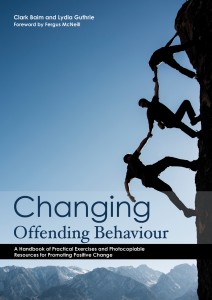Changing Offending Behaviour is a one-stop resource of practical exercises for professionals to use in direct work with offenders aged 16+, written by Clark Baim and Lydia Guthrie. In this blog post Lydia explains why they decided to write the book, as well as sharing one of her favourite exercises which you can download and try out for free at the bottom of this post.
This handbook of practical resources is our contribution to the growing knowledge base about effective and evidence-based interventions with people (age 16 plus) who have committed offences of all types. We hope that it will be of use to front-line workers in a wide range of settings, including the criminal justice, social work, forensic hospitals, drug and alcohol rehab services, voluntary agencies, etc.
 In our work as trainers, supervisors, facilitators and the authors of offending behaviour programmes, it has become clear to us that there is a need for a practical, theoretically coherent and user-friendly workbook for busy frontline practitioners. This book is explicitly not a manual – it is a practice guide which invites the worker and the client to enter into a dialogue about which approaches and exercises may be relevant, and which may be less so. The book also offers guidance about how to adapt each exercise for clients with particular needs, or learning preferences, and there is a focus upon active and brain friendly methods of learning.
In our work as trainers, supervisors, facilitators and the authors of offending behaviour programmes, it has become clear to us that there is a need for a practical, theoretically coherent and user-friendly workbook for busy frontline practitioners. This book is explicitly not a manual – it is a practice guide which invites the worker and the client to enter into a dialogue about which approaches and exercises may be relevant, and which may be less so. The book also offers guidance about how to adapt each exercise for clients with particular needs, or learning preferences, and there is a focus upon active and brain friendly methods of learning.
The aim of working with people who have committed offences must always be to prevent further reoffending (and the associated harm to victims and the community) by supporting the person who has offended to develop and maintain a positive and offence-free future. Our value base is that people who have committed offences are first and foremost “people like us”, and will have far more in common with every other human being than they will have differences. (This may seem like a glaringly obvious point, but one which some approaches to rehabilitation seem to miss!)
It is our belief that most people are capable of personal change when motivated, given the opportunity to express themselves differently, the correct support, and the opportunity to try out new ways of dealing with life’s challenges. Change is difficult, can be frightening, and there are often setbacks.
In writing this handbook, we have drawn upon a wide range of evidence-based methodologies, theories and treatment approaches, including Desistance Theory, The Good Lives Model, Cognitive Behavioural Theory, Attachment Theory, Social Learning Theory, Motivational Interviewing, Mindfulness and Self Compassion and Skills Practice. Chapter One of the book offers a brief review of these theoretical approaches, among others. Chapter Two focuses on essential skills for practitioners, such as the skillful use of questions, forming a therapeutic relationship and working motivationally with denial and resistance. The rest of the book is devoted to over 30 exercises which are designed to promote positive change. These exercises include some which you may recognise, such as a family tree, a life line, a cognitive behavioural analysis of the offence, and exercises designed to promote increased empathy with the victim or others affected by the offence. The common theme running through the exercises is that they are designed to support the client in understanding his or her life narrative, how harmful patterns of behaviour may have developed, how to build constructive and healthy relationships, and how to set positive goals for future life. All the exercises are clearly described, with a range of adaptations, and photocopiable worksheets.
You can try out a sample exercise from the book, ‘The Relationships Ladder’, by downloading it for free here.
Find out more about the book, read reviews or order your copy here.
You can find out more about the training and consultancy work Lydia and her co-author Clark Baim provide on their website Change Point Ltd, and you can also find them on twitter here.